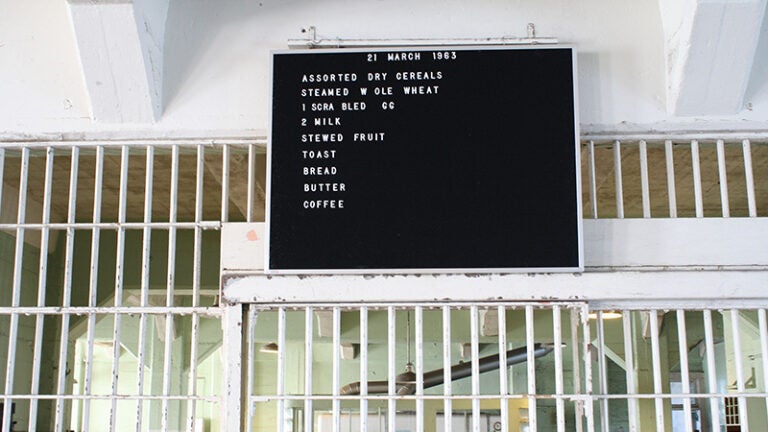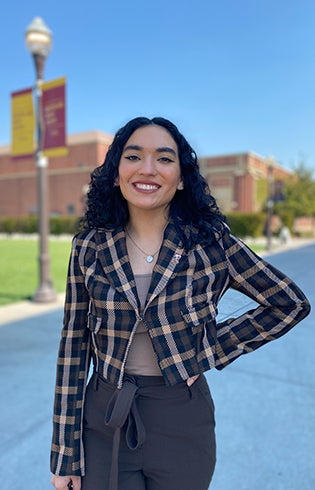
Through Agents of Change program, student lobbies for safer, healthier food in jails
Moldy fruit, spoiled meat, half-frozen bread, a lack of religious meals — by April 2021, the American Civil Liberties Union of Southern California had been fielding complaints from incarcerated individuals in Orange County about the quality of their food for nearly a year. As an intern with the ACLU through the Agents of Change program at the USC Dornsife College of Letters, Arts and Sciences, Alyssa Matias soon realized the issue was not one of dietary dissatisfaction but a violation of the rights of the incarcerated.
“A lot of people were calling, over and over, and saying they hadn’t been receiving any hot meals for several months, that they were getting moldy food and that they were being denied their religious or medical diets,” says Matias, a junior majoring in political science with a minor in legal studies at USC Dornsife.

Alyssa Matias pushed for adequate food quality in jails, as state law requires. (Photo: Courtesy of Alyssa Matias.)
Matias explains that according to rules set out by the California Board of State and Community Corrections (BSCC), county jails must serve at least one hot meal per day. In April 2020, the Orange County Sheriff’s Department had suspended hot meals due to concerns about food preparation in the wake of the COVID-19 pandemic, but a year passed and the hot food did not return. BSCC Deputy Director Allison Ganter told Matias that no jails had applied for exemptions to the hot meal rule during the pandemic, meaning there was no reason that incarcerated people shouldn’t have been served hot meals.
After consulting with her supervisors at ACLU, Matias wrote a demand letter in April 2021 to the BSCC detailing the jails’ dietary practices. Ganter communicated with the Sheriff’s Department on the matter, and the department admitted that it was not in compliance with the meal regulation, Matias says. As of now, the Sheriff’s Department has started serving hot oatmeal and hot soup in county jails, which Matias cites as progress.
“It was a really good experience. I felt like I was able to communicate what everybody who is incarcerated was telling me, and I was really able to advocate for them,” she says.
A public advocate
Growing up in Chicago, Matias says she witnessed the effects of racism firsthand.
“I have two younger brothers, and all of us are people of color. It made me feel more passionate about creating an environment where I didn’t have to be afraid when they went out with their friends or by themselves,” she says. “Those are the kinds of things that motivated me to pursue a career in social justice.”
When she arrived at USC, Matias joined the Trial Advocacy Program, which prepares students for law school by teaching them how to examine witnesses, present objections and craft speeches. Matias credits the program, which has a strong emphasis on social justice issues, and the “Trial Advocacy Program (Mock Trial)” (POSC 398) course that accompanies it with providing her with the legal framework, training and skills needed to understand issues of the law.
When Trial Advocacy Program Director Olu Orange, adjunct assistant professor of political science at USC Dornsife, mentioned that he was beginning Agents of Change, Matias decided to join him. She successfully applied to the program, and in January 2021 she was placed in an internship in ACLU Southern California’s jails and justice division, where she answered hotline calls from people incarcerated in Orange County. The callers describe civil or human rights violations or any other problems they’ve experienced while incarcerated, and Matias investigates the claims and communicates with the necessary jail staff.
Although her internship gave her the opportunity to learn skills like legal communication and procedures, Matias says its most meaningful aspect was the chance to work directly with those experiencing injustice.
“Having the opportunity to speak directly with those who are most impacted has been the most enlightening experience that I could have ever asked for, and I owe that all to Agents of Change. I think that anybody that is interested in doing this work absolutely should participate,” she says.
Since Agents of Change is a two-year program, Matias will begin another internship in the fall, this time with the California Department of Fair Employment and Housing. Looking ahead, she hopes to attend law school and eventually become a juvenile public defender.
“In a course that I took, I found out that nearly all juveniles who enter the legal system have experienced some kind of trauma, and I learned that incarceration really is just a form of re-traumatization,” she says. So, I feel very passionate now about doing whatever I can to prevent the incarceration of youth.”